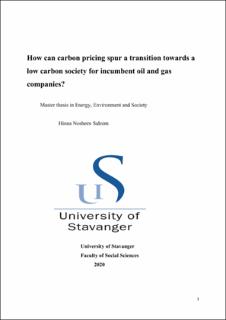| dc.description.abstract | Many countries propone that a rapid transition towards a low-carbon society is crucial to avoid catastrophic climate change effects. Carbon pricing has resurfaced as a viable policy option that can facilitate this transition towards a low-carbon society. Many societal actors including actors within the Norwegian oil and gas are placing stronger emphasis and commitment to conduct their business activities and practices in a way that reduces greenhouse gas emissions from their operations as well as displaying increased support for carbon pricing. The aim of this thesis is, therefore, to analyze how carbon pricing can spur a transition towards a low-carbon society for incumbent oil and gas companies. This question is approached by conducting a systematic literature review and interviewing key informants.
The research undertaken in this thesis has revealed that carbon pricing does have the potential to spur a transition towards a low carbon society. However, due to low level of prices and that only 20 per cent of global emissions are covered by carbon pricing, the status quo is that these emissions reductions fall short of achieving the climate goals of limiting a temperature increase below 2°C, as enshrined in the Paris agreement. To attain these ambitions, it necessitates a strengthening of carbon pricing policies by implementing higher carbon prices as well as increasing the scope of carbon pricing globally. Another factor, which is also vital for the low carbon transition, is to increase public acceptability of carbon pricing by providing information provision and revenue recycling to the public or green spending. Additionally, it is also essential to spur the development of renewable energy and other low carbon technologies such as CCS. This thesis also looked at the feasibility of implementing global price commitment on carbon pricing; nonetheless, this was found to be unattainable, due to difficulties of achieving an agreement of this sort.
A compelling factor also discovered in this study is that it is equally important to address some of the challenges that are present in this low carbon transition, which includes: Time and pace of transition, political and behavioural challenges and technological development and cost. Similarly, societal actors also need to consider some of the challenging aspects associated with the vision of a net-zero society. | en_US |
